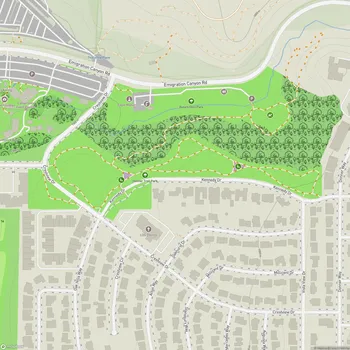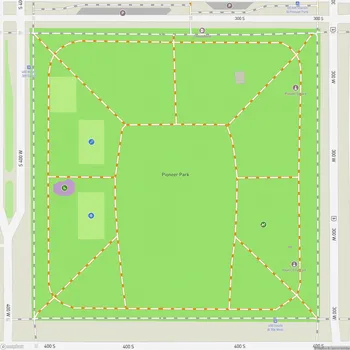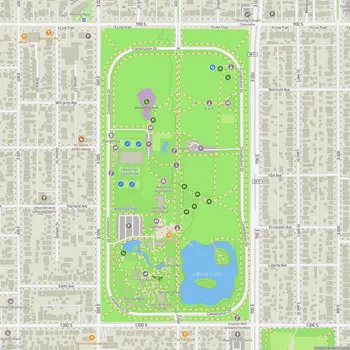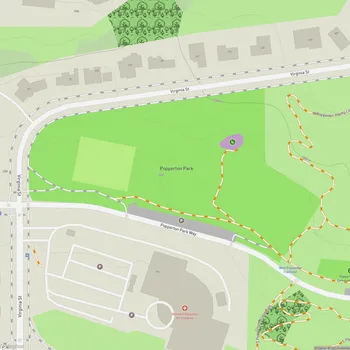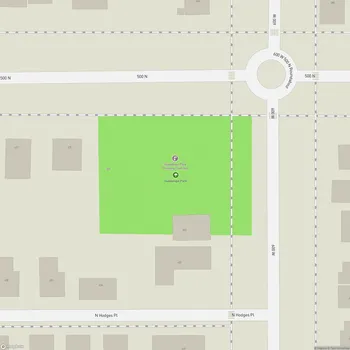Lee Charles Miller Bird Refuge and Nature Park
Interactive Park Map
About Lee Charles Miller Bird Refuge and Nature Park
A Historic Haven in the City
Positioned in Salt Lake City since 1935, Miller Bird Refuge and Nature Park came to life when Minnie Miller gifted the land to the city as a tribute to her husband, Lee Charles. What makes this place special? It's not just a park - it's a sanctuary where both wildlife and children can thrive.
As you wander through, you'll notice the gorgeous old masonry scattered throughout - walls, chairs, benches, stairways, and a charming footbridge. These aren't just pretty features; they're pieces of history created by the Works Progress Administration (WPA) during the Great Depression, providing much-needed employment during tough times.
A Natural Treasure
The park hugs the banks of Red Butte Creek, creating a lush habitat that's pretty remarkable in Utah's typically dry landscape. Though streamside environments make up a tiny 0.4% of Utah's land, they're vital - supporting over 75% of all bird species in the state.
Keep an eye out for river hawthorn and other native plants that attract a variety of feathered visitors, from black-chinned hummingbirds to downy woodpeckers and ruby-crowned kinglets.
Exploring the Grounds
Spanning about 8.75 acres, the park offers two large loop trails that let you immerse yourself in this natural setting. Don't worry about difficult terrain - while the park is built on a hill, the paths aren't particularly steep, making them manageable for most visitors.
Rebirth and Restoration
2010 marked a turning point for the park after a crude-oil spill affected Red Butte Creek. Instead of spelling disaster, this event sparked a comprehensive restoration project. Improvements to the streambed and banks, coupled with the introduction of native plants and removal of invasive species, have helped the park bounce back stronger than before.
These conservation efforts have preserved what makes this place special - a thriving ecosystem in an urban setting.
In the heart of Salt Lake City, Miller Bird Refuge and Nature Park offers a quiet retreat where you can disconnect from city life, breathe in fresh air, and maybe spot a hummingbird or two along the way.
All Features & Facilities
Nature & Wildlife
Water Features & Activities
Visitor Services
Photo Gallery
 AD
ADSalt Lake City Big City Loop Bike Tour
Get a comprehensive look at Salt Lake City with the Big City Loop Tour, an exploratory, 3-hour bicycle ride at the 'Crossroads of the West.' Groups will ride bikes to all points of interest in the greater Downtown Salt Lake City area, both historical and current. Make multiple stops along the way for breaks, photos, and good old rest.
ParkMagnet Score
Good Park
Park Size
Opening Hours
Weather
Top Restaurants Near Lee Charles Miller Bird Refuge and Nature Park
Nomad East
0.3 miles1675 E 1300 S, Salt Lake City, UT 84105
Contemporary American restaurant featuring artisanal pizzas with fresh toppings and crispy crusts alongside creative salads.
Emigration Cafe
0.4 miles1709 E 1300 S suite 108, Salt Lake City, UT 84108
A neighborhood cafe offering generous portions, outdoor patio dining, and casual American fare including salads and burgers.
Mi Buena Vida
0.7 miles1500 S 15th E St, Salt Lake City, UT 84105
A Mexican restaurant featuring fresh fish tacos, flavorful enchiladas, and an impressive homemade salsa bar.

